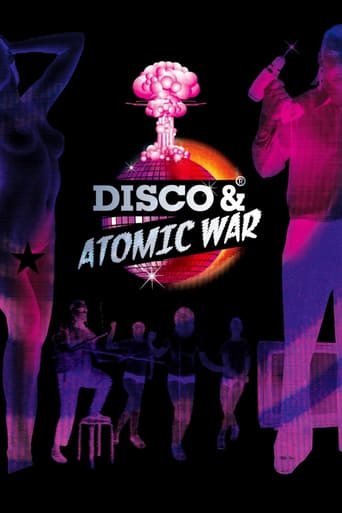tonyw-21
Disco & Atomic War screened last night at the European Union Film Festival. The film came highly recommended by Canadian Film Institute Executive Director Tom McSorley. While I found the story board fascinating, the film failed to deliver. The story is told like a documentary (which it is not) in roughly chronological sequence (1950's to the fall of the Iron Curtain in 1989). The principal cast do not stand out, and yet much of the history is left to be told (non-dramatically) via interviews with various academic historians. The English subtitles on the version screened by EUFF were virtually non-decipherable! This was no doubt an interesting period of Cold War history, but this dramatization did not work for me.
reigntall
Disco and Atomic War is an entertaining and intriguing documentary about a lesser known aspect of the later years of the Soviet Union. It focuses on how people in Northern Estonia were able to peek out from behind the Iron Curtain through Finnish television and radio, which enables the people to learn about things such as, well, Disco.The way the information is presented is entertaining. They use clips of television shows and commercials of the time and tell amusing stories of the inhabitants of Tallinn (the capital of Estonia, located in the North), and of the powers that be, who tried to somehow control the "westernizing" of the local people.The stories are somewhat absurd, and provide some fun humor into this documentary, a genre of movie which usually isn't all that "entertaining".The effects of the subject matter, TV and radio, on the fall of the Soviet Union is blown a bit out of proportion, but that is normal for a documentary.This is an excellent film about a topic, that is not as well known, even by the younger people in Estonia, who weren't alive at the time.
nmlhats
I chose this entry at the Dallas Int'l Film Fest based on its intriguing description (ok, the "Dallas" connection clinched the deal). The film describes the history of popular western culture as depicted on television as a deliberate use of "soft power" in the cold war. While it was mildly entertaining and reasonably interesting, it was not what you would call compelling viewing or taut storytelling. The narrative did not flow well and there was a substantial amount of somewhat "off-topic" footage and content. We "follow" several children who grew up with the pirated Finnish TV signal, but their tales are disjointed. Some of the footage seems like it was from an era earlier than the time it was meant to depict. The basic tale is interesting from a historical standpoint, but the filmmaker is unsuccessful in translating to the screen what sounds like a great idea on paper. With judicious cuts and editing it would make a great one-hour PBS documentary, but it does not hold up as a feature-length film.
orzy
VEry funny and inspiring comedy-fairy tale: Film shows The adventures of a TAlinn-teenager who starts watching TV programs when Finland TV starts to reach Estonia. The never ending attempts of the communist regimes in TAllinn and Moscow to stop citizens from viewing these programs, result in a heroic struggle of the people, supported by their most whizzkid electronic engineers. The technical barriers, thought out by the bureaucrats are outsmarted after every move, by making use of simple household appliances, for which demand then all of a sudden rises to the sky. Forbidden fruits most popular : "DAllas"(the Texan oil-saga) and .... the advertisements of a butcher, showing all the various meats freely available in the Finish market. Go see this David-Goliath saga, you will not regret it!

